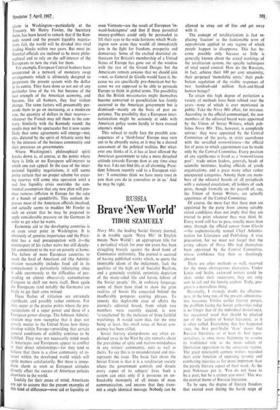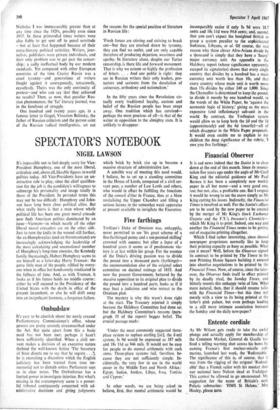Brave 'New World'
RUSSIA TIBOR SZAMUELY
Novy Mir, the leading Soviet literary journal, is in trouble again. `Novy Mir' in English means 'New World': an appropriate title for a periodical which for over ten years has been struggling bravely against the dead hand of Communist uniformity. The journal is accused of having published works which, to quote the inimitable idiom of the indictment, 'lack the qualities of the high art of Socialist Realism, and a genuinely truthful, optimistic depiction of the many-sided life and heroic labour of the Soviet people.' Or, in ordinary language, some of them have tried to show the grim realities of Soviet life concealed behind the insufferably pompous canting phrases. To remedy this deplorable state of affairs the journal's editorial board, from which two members were recently ejected, is now 'strengthened' by the inclusion of three faithful watchdogs. It would seem that, for the time being at least, this small voice of Soviet con- science has been stilled.
Soviet literary clamp-downs are often ex- plained away in the West by airy remarks about the prevalence of spite and narrow-mindedness in any writers' community, ours as well as theirs. To say this is to misunderstand and mis- represent the issue. The basic fact about the Soviet Union is that it is a totalitarian society where the government controls and directs every aspect of its subjects' lives. Such a system can exist only if it possesses an un- breakable monopoly of all means of mass communication, and ensures that they trans- mit a single identical message. Nobody can be
allowed to stray out of line and get away with it.
The concept of totalitarianism is fast re- placing 'fascism' as the fashionable term of opprobrium applied to any regime of which people happen to disapprove. This has be- come possible only because so little is generally known about the actual workings of the totalitarian system, the specific techniques of total social control. How do the Russians, in fact, achieve their 100 per cent unanimity, their perpetual 'monolithic unity,' their push- button regulation of the visible responses of two hundred-odd million flesh-and-blood human beings?
To attain this high degree of perfection a variety of methods have been refined over the years—none of which is ever mentioned in public. Take the Novy Mir affair, for instance. According to the official communiqué, the new members of the editorial board were appointed by the Union of Soviet Writers, which pub- lishes Novy Mir. This, however, is completely untrue: they were appointed by the Central Committee of the party, in strict accordance with the so-called nomenklatura—the official list of posts to which appointment can be made only by the Central Committee. Every position of any significance is listed as a `nomenklatura post': trade union leaders, generals, heads of scientific institutes, leading officials of youth organisations, and a great many other rather unexpected categories. Among them are mem- bers of the editorial boards of all periodicals with a national circulation; all holders of such posts, though formally on the payroll of, say, the Union of Soviet Writers, are actually appointees, of the Central Committee.
Of course, the mere fact that these men are appointed by the party from among suitably vetted candidates does not imply that they are trusted to print whatever they may think fit. Every word still has to pass, usually more than once, through the official censor from Glavlit —the euphemistically named Chief Adminis- tration for Literature and Publishing. A wise precaution, for we must not forget that the erring editors of Novy Mir had themselves been appointed by the Central Committee, whose confidence they then so shockingly abused.
There are other methods as well, reserved for the more obstreperous characters. Under Lenin and Stalin, awkward writers could be shot; under their successors, they are only sent to jail and the lunatic asylum. Truly, pro- gress is a marvellous thing.
Personally, I strongly doubt the effective- ness, in the long run, of the present administra- tive measures. Unlike earlier literary purges, the problem facing the Soviet authorities today is no longer that of the individual deviationist, the occasional weed that should be plucked out of the 'garden of Soviet literature,' as it is often called. Everything that has happened since the first post-Stalin 'thaw' shows that Russian literature, or at least its best repre- sentatives, is once more beginning to assume its traditional role as the main vehicle of libertarian opposition to the autocratic regime. The great nineteenth century writers regarded their civic function of opposing tyranny and combating injustice as far more important than the purely literary aspect of their work. As the poet Nekrasov put it, 'You do not have to be a poet, but be a citizen you must.' This was the central theme of Russian literature.
To be sure, the degree of literary freedom that existed even during the harsh reign of
Nicholas I was immeasurably greater than at any time since the 1920s, possibly even since 1917. In those primordial times writers were also liable to get sent off to penal servitude —but at least that happened because of their extra-literary political activities. Writers, jour- nalists, publishers were private individuals, and their only problem was to get past the censor- ship: a sadly ineffectual body by our modern standards. Yet compared with other European countries of the time Czarist Russia was a cruel tyranny—and generations of writers fought against it courageously, tenaciously, ceaselessly. Theirs was the only continuity of protest—and who can say that they achieved no results? Then, as now, that peculiar Rus- sian phenomenon, the `fat' literary journal, was in the forefront of struggle.
One hundred and twenty years ago, in a famous letter to Gogol, Vissarion Belinsky, the father of Russian criticism and the patron saint of the Russian radical intelligentsia, set out the reasons for the special position of literature in Russian life: `Fresh forces are stirring and striving to break out—but they are crushed down by tyranny, they can find no outlet, and are only capable therefore of producing dejection, weariness and apathy. In literature alone, despite our Tartar censorship, is there life and forward movement. That is why we esteem so highly the profession of letters. . . . And our public is right: they see in Russian writers their only leaders, pro- tectors and saviours from the desolation of autocracy, orthodoxy and nationalism.'
In the fifty years since the Revolution vir- tually every traditional loyalty, custom and belief of the Russian people has been swept away. One tradition which has survived— perhaps the most precious of all—is that of the writer in opposition to the almighty state. It is unlikely to disappear.































 Previous page
Previous page